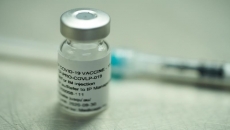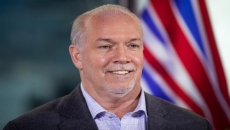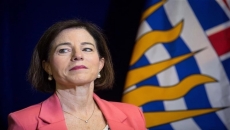Positive news about vaccine delivery won't be enough to give the economy a shot in the arm to start 2021, the Bank of Canada said Wednesday as it kept its key interest rate on hold and warned rising COVID-19 cases in Canada will weigh on near-term growth.
We have maintained our policy interest rate at 0.25% and are continuing our quantitative easing program. Find out more. #economy #cdnecon https://t.co/RM414Yc8f6 pic.twitter.com/LlRgwkP2eI
— Bank of Canada (@bankofcanada) December 9, 2020
The central bank said business restrictions in response to burgeoning case counts will hold down economic growth for the first three months of the new year and that the virus will "contribute to a choppy trajectory until a vaccine is widely available."
It also made a nod to federal aid to households and businesses that the bank said should maintain incomes during this second wave of COVID-19, and aid in recovery efforts.
The Canadian economy took a nosedive in March and April when the pandemic first washed over the country, as non-essential businesses were ordered closed, workers told to stay at home and some three million jobs were lost.
Since then, the country has clawed back just over four-fifths of those job losses, with growth for the last quarter of 2020 outpacing what the bank expected.
The central bank's most recent economic forecasts were based on having a vaccine becoming widely available in 2022, not by next year as now appears the case.
Positive vaccine news was "providing reassurance that the pandemic will end," the bank's statement said, adding that questions marks remain around the "pace and breadth of the global rollout."
Shortly after the statement went out, Health Canada approved Pfizer's COVID-19 vaccine for use in this country.
"That positive vaccine news really more than offsets those concerns about the near-term economic backdrop," said RBC senior economist Josh Nye.
"There is reason for the bank to be a bit more optimistic, but...they were sort of guarded in that optimism."
Indeed, Wednesday's statement said the economy will need "extraordinary monetary policy support" in the forms of a rock-bottom policy rate and a continued bond-buying program unprecedented in the central bank's history.
The central bank held its key policy rate at 0.25 per cent. It also announced it would continue its quantitative easing program by buying $4 billion of bonds per week.
Both moves are designed to drive down interest rates on things like mortgages and business loans to prod spending and ease debt loads.
The central bank said it will hold the policy interest rate at the effective lower bound, meaning it is as low as the bank believes it can go, until economic slack is absorbed so that its two per cent inflation target is sustainably achieved.
In its statement, the Bank of Canada said it doesn't expect inflation to get back on target until some time in 2023.
Benjamin Reitzes, BMO's director of Canadian rates, noted the caveat that the projection is from October's forecasts, "suggesting the timeline could change in the January" update.
The announcement marks the last interest rate decision the central bank will make this year, after an extraordinary 2020 that saw it slash rates in response to the economic crisis caused by COVID-19.
The central bank's extraordinary actions have put it into political crosshairs on Parliament Hill, where Conservatives have questioned its bond-buying program that effectively provides low-cost financing of federal debt.
During Tuesday's meeting of the House of Commons finance committee, Finance Minister Chrystia Freeland defended the bank's independence from the government under questioning from Conservative critic Pierre Poilievre.
"It is something that I as finance minister prize and respect and I think that all MPs should do likewise," she said.
The bank's next rate decision will be in late January, at which time it will update its economic and inflation outlook.
Wednesday also marked a change in the upper echelons of the bank's leadership, as senior deputy governor Carolyn Wilkins departs after a nearly 20-year career at the Bank of Canada.
In a tweet, Freeland thanked Wilkins for her years of service, saying her "leadership, dedication and expertise have been invaluable," particularly during the pandemic.
Thank you Carolyn Wilkins for your two decades of service at the @bankofcanada, most recently as Senior Deputy Governor. Your leadership, dedication and expertise have been invaluable, particularly during the #COVID19 pandemic.
— Chrystia Freeland (@cafreeland) December 9, 2020






